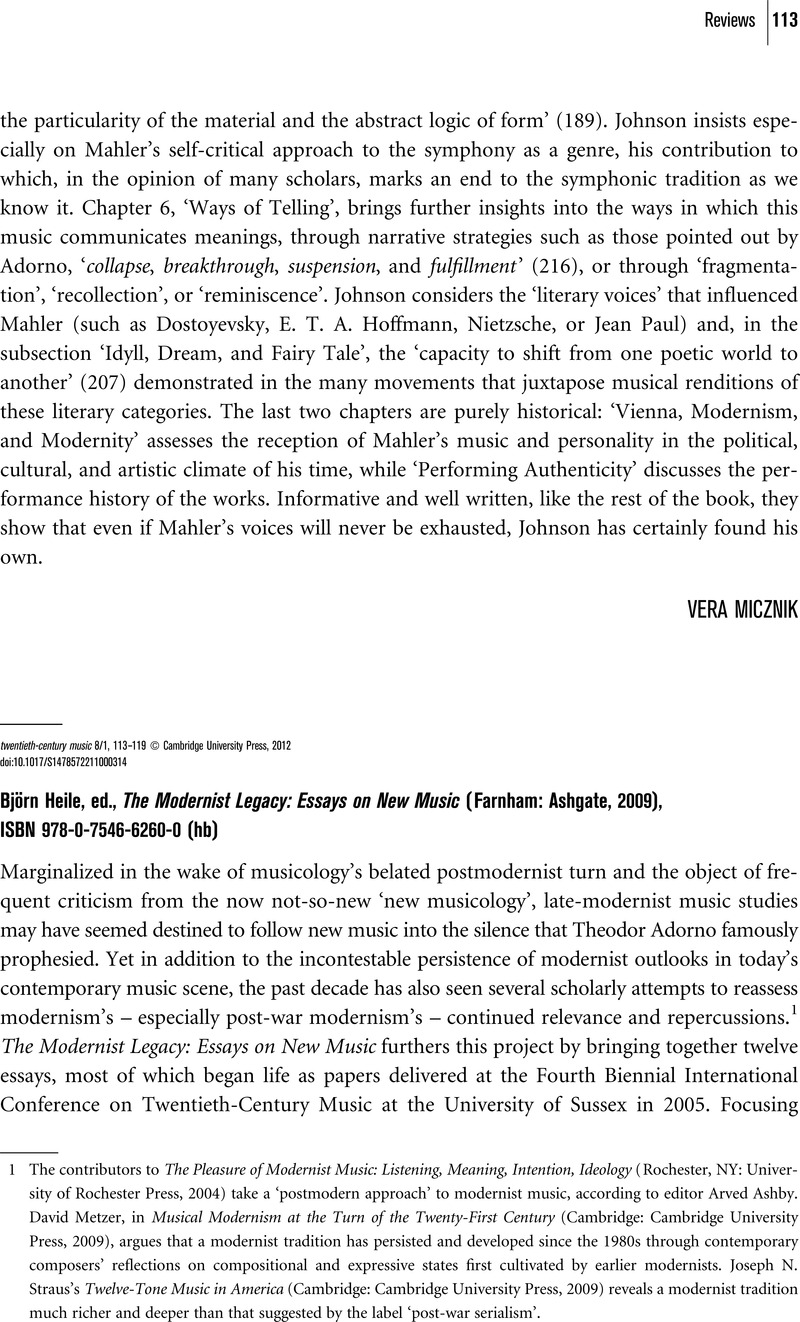No CrossRef data available.
Article contents
Björn Heile, ed., The Modernist Legacy: Essays on New Music (Farnham: Ashgate, 2009), ISBN 978-0-7546-6260-0 (hb)
Published online by Cambridge University Press: 23 February 2012
Abstract

- Type
- Reviews
- Information
- Copyright
- Copyright © Cambridge University Press 2012
References
1 The contributors to The Pleasure of Modernist Music: Listening, Meaning, Intention, Ideology (Rochester, NY: University of Rochester Press, 2004) take a ‘postmodern approach’ to modernist music, according to editor Arved Ashby. Metzer, David, in Musical Modernism at the Turn of the Twenty-First Century (Cambridge: Cambridge University Press, 2009)Google Scholar, argues that a modernist tradition has persisted and developed since the 1980s through contemporary composers’ reflections on compositional and expressive states first cultivated by earlier modernists. Straus, Joseph N.'s Twelve-Tone Music in America (Cambridge: Cambridge University Press, 2009)Google Scholar reveals a modernist tradition much richer and deeper than that suggested by the label ‘post-war serialism’.
2 In addition to Drott's recent scholarship, a notable application of Bourdieusian sociology to French modernist music of this period is, of course, Born, Georgina's Rationalizing Culture: IRCAM, Boulez, and the Institutionalization of the Musical Avant-Garde (Berkeley: University of California Press, 1995)CrossRefGoogle Scholar, though the original ethnographic fieldwork for this study is now more than twenty-five years old.
3 Kutschke, Beate, Neue Linke / Neue Musik: Kulturtheorien und künstlerische Avantgarde in den 1960er und 70er Jahren (Cologne: Böhlau, 2007)Google Scholar.
4 Most notable, perhaps, has been Hardt, Michael and Negri, Antonio, Empire (Cambridge, MA: Harvard University Press, 2000)Google Scholar. Žižek, Slavoj, in Organs without Bodies (London: Routledge, 2004)Google Scholar and numerous articles, has questioned the efficacy and ethics of applying Deleuzian concepts to the critique of global capitalism. From a very different but relevant perspective see also John Rahn's discussion of the anthropological influences on Deleuze and Guattari in ‘Mille Plateaux, You Tarzan: a Musicology of (an Anthropology of (an Anthropology of A Thousand Plateaus))’, Perspectives of New Music 46/2 (2008), 81–92.
5 From Ferneyhough, Brian, ‘Il Tempo della Figura’, in Collected Writings, ed. Boros, James and Toop, Richard (Amsterdam: Harwood Academic Publishers, 1995), 41Google Scholar; italics original.




